- Home
- Celeste O. Norfleet
The Thrill of You Page 7
The Thrill of You Read online
Page 7
“Actually, I think that’ll work just fine, too.”
Her stomach twisted and shuddered as she licked her lips. She felt his body come to life and gasped quietly. “I have a feeling we’re gonna skip dinner and go right to breakfast again. Which actually isn’t such a bad idea, since the more we’re together physically, the better the odds are I’ll get pregnant sooner. And according to my electronic ovulation calendar, next week is optimal for me to conceive. That means the next few days are vital. So why don’t we skip dinner and go upstairs?”
He bit his lower lip and shook his head. “Tempting, very tempting, but you need to keep up your strength.”
“I’m fine.”
“We have all the time in the world,” he said. He zipped her dress back up. She glanced over her shoulder. She had no idea when and hadn’t even felt it when he had zipped her dress down.
“When did you...?”
He smiled. “Let’s go.” They went back into the kitchen. He divided the chores. Cyanna made the salad, while Mikhail prepared the food on the inside cooktop grill. Afterward she kept him company sitting at the counter. She was surprised that he actually knew his way around the kitchen. A half hour later Cyanna set the table outside and Mikhail brought their dinner out and lit the candles set in tall glass hurricane shades around the patio. They sat, ate and talked about their travels and their favorite places. After dinner they cleaned up the kitchen, then went back outside.
Dusk had long settled, and the sun had set beyond the trees. They sat on the double chaise, looking out at the spectacular view. Muted light from the candles and soft landscape lighting around the pool and hanging from the trees illuminated the area just enough to set the mood. It was the perfect evening.
“Are you ever going to tell me the third condition?”
“Yes.”
“When?” she asked.
“When you’re ready to hear it,” he said.
“I’m ready now,” she insisted. He didn’t respond. She knew he wouldn’t. “Okay, so exactly how involved in my child’s life do you intend to be? Once a month visitation or just a Father’s Day card in June?”
“In our child’s life,” he corrected. “I intend to be very involved, daily, hourly involved.”
“That might be a problem. What if I’m seeing someone?”
He turned quickly. His eyes narrowed; then he saw her humorous expression. “Not funny.” She chuckled. “So I know you’re a world-renowned artist and you started playing the violin when you were very young. Tell me about being a professional violinist.”
“What do you want to know?” she asked.
“How do you get your concert jobs? Do conductors call you?”
“No. I have an artist manager. She arranges my larger-venue tour dates with orchestras and ensembles a year in advance. I’m contracted and they pay me a floating artist fee. My smaller hall performances are usually set according to my availability. I also receive solo and private engagement invitations to perform. If it fits into my schedule, I agree to go.”
“So you’re paid per performance.”
“More like per engagement, which is usually two to three performances at a time. But it can also depend on the type of engagement and performance requested. Financially I can make more money doing a onetime private engagement than a three-night concerto in a major venue performance.”
“How often do you perform?”
“That depends, usually once or twice a month during my touring season, sometimes more and sometimes less.”
“And what do you do when you’re not performing?” he asked.
“I mentor. I teach. I practice. I try to get better. I learn new music.”
“And you play a Stradivarius, correct?”
“Yes, I do.”
“They’re pretty pricey.”
“Classic performers at a certain career level don’t actually own their instruments. They’re loaned to them from syndicates, companies and very rich patrons.”
“I read about a violin called a Guarneri del Gesù.”
“I’m impressed. Most people think all violins look and sound alike. But it’s the sound quality and instrument tone that separates them. A Guarneri del Gesù is an exquisite instrument. It’s as perfect as a violin can be. And it’s very rare. There are only about one hundred and forty in existence. In comparison, there are about six hundred Stradivarii. Both instruments cost well over a million dollars and very rarely come available.”
“Why is that?”
“They’re usually bought by very wealthy patrons, lent out to musicians and passed down through the generations.”
“Who owns your instrument?” he asked.
She smiled. “A friend,” she said cryptically.
Mikhail nodded. She didn’t have to elaborate. He knew exactly who the friend was, Ammar Robah and his grandfather, Aziz. “What would you be doing if you hadn’t picked up a violin?”
She opened her mouth, then closed it. His previous questions were all pretty common. Her answers were all interview safe. She’d been asked those same questions a hundred times, so they were no big deal. She didn’t even have to think to answer. But this question was completely out of the blue. She shook her head. “Wow, that’s an interesting question. No one’s ever asked me that before. To tell you the truth, I don’t know. I have no idea what I’d be doing. What about you?”
“What do you mean?”
“Was it hard to suddenly change careers overnight?”
Mikhail looked at her, wondering exactly how much she knew about him and what he did for a living. “Yes. It was hard. I thought I’d be in service until I retired.”
“But it didn’t happen that way.”
“No, it didn’t.”
“Still, in the process your bravery made you a national hero.”
He shook his head. “Not what I intended.”
“When you single-handedly rescue the secretary-general of the United Nations and his family and it’s caught on video by a vacationing photojournalist and then goes viral on the internet, you tend to get noticed, a lot.”
“Again, not what I intended. I was just doing my job. I had no idea the civilian was videotaping me.”
“It sounds like you regret what happened.”
“Just the notoriety that came afterward,” he said. “That one ten-minute video changed everything for me. My life was no longer my own anymore. My job and the people I worked with were in jeopardy. I had no choice but to walk away. I was hounded for interviews for months. I still get news people coming here looking for a story.”
“I don’t remember you ever doing an interview. Did you?”
“No, not even with my sister Tatiana,” he said. “She never asked, and I know her editors and publisher hounded her about getting one. But she knows me too well. When I signed my name on the line I belonged to this country. You never betray that, certainly not for fifteen minutes of fame and a couple of bucks.”
“Integrity, not at all surprising. You’re a remarkable man, Mikhail Coles,” she said. He smiled tightly, obviously embarrassed by the compliment. “Are you blushing?”
“Hardly,” he said, deepening his voice. “Men don’t blush.”
“Sure they don’t. So, do you miss the job?”
“Yes, sometimes,” he said truthfully.
“Would you ever go back?”
“Interesting question,” he said evasively, looking away.
She noticed he didn’t actually answer her, but she decided not to push it. “I know you were colleagues and friends, but how well did you know my brother?” she asked instead.
He turned and looked back at her. “Well enough.”
“How well is that?” she asked, guessing he wouldn’t answer.
“We worked toget
her a few times.”
“Did he ever talk about me?”
“Let me think. Yeah, he did, but only nonstop,” he assured her.
She smiled happily. “Did you know about his past?” she asked.
“What about it?”
“He could sometimes be a little impulsive and fearless, some said reckless with the tendency to take the term bad boy a bit too far.”
“What do you mean?”
“He had a hair-trigger temper, and that got him in trouble.”
“What kind of trouble?”
“Well, after our parents died in a car accident, our dad’s brother, Jimmy, took us in. I was eight and Derek was sixteen. He and Derek did not get along from the beginning. Derek was strong, tall and angry most of the time. Our uncle Jimmy had no idea what to do with two kids living with him. So he just went about his usual life, having parties and doing whatever.”
“What exactly is whatever?” Mikhail asked.
“Drinking, gambling, women. And he had parties, a lot of them. And also his friends would stop by and hang out playing cards all night. Two weeks before we were sent to foster care, Jimmy had a poker game and there was a huge fight. Derek beat this guy really badly.”
“What started the fight?”
“One of Jimmy’s friends got...” She paused, choking up, and took a deep breath. “He got overly friendly with me. I hit him and kicked him. He punched me and knocked me down. When he tried to get on top of me, I screamed. Derek ran in and he went crazy on that guy. It took four grown men to pull Derek off him. Derek beat him bad with his fists. There was blood everywhere. The guy was so bad off they had to call an ambulance. The police came and took Derek. The guy didn’t want to press charges.
“Nobody listened to me at first when I said Derek was defending me from the guy. See, our uncle’s friend was an assistant D.A. and Sunday school teacher and he lied through his teeth. The police put Derek in juvenile hall. Then a social worker saw my scratches on the guy’s face and his blood under my nails. She filed a report to a sympathetic judge and things blew up. Apparently Jimmy’s friend had a history of sexual assault, but they kept covering it up to protect him and the job.
“They tried to bury it again, but the social worker threatened to go to the press. They didn’t charge Derek with anything, half because he was a minor and half because it would have been a PR nightmare. We were removed from Jimmy’s house and taken to foster care the next week.”
“And this upstanding citizen, what happened to him?”
“He was shot breaking into a woman’s house. She wasn’t home, but her young teenage daughter was. He insisted he lost his keys and thought it was his house he was breaking into. Of course his house was eight blocks away and looked nothing like the woman’s house. I heard he’s paralyzed from the waist down, in a wheelchair and still denies everything even though they found pornography on his work computer and his cell phone showed he’d been stalking the woman and her daughter for weeks.”
“The social worker, she’s the one who introduced you to the violin, right?” he said.
“How did you know that a social worker introduced me to the violin?” she asked.
“You’re not the only one who checks up on people. I looked you up online. Your Wikipedia page was very informative.”
She nodded. “Yes, she was. She used to listen to classical music in her office. It was the first time I’d ever heard music like that. I was amazed. She saw that I loved it. One of her nephews had to play the violin in school and he hated it. She asked me if I’d like to try it. I’d listened to her music so much that as soon as I touched it, I knew exactly what to do and how each string sounded.” She smiled, remembering.
“Mrs. Hunter called me a savant. At the time I had no idea what that even was. But she said I inhaled the music like breathing and that playing the violin was the only thing that calmed my heart. Her husband was a Baptist preacher, and they had a house full of foster kids. They took us in. Derek stayed for a few years, then enlisted. He knew I’d be safe with them. They got me lessons, and after a while I started teaching the teacher. Then I went to Juilliard Pre-College Division.”
“So you studied at Juilliard.”
“For a while, yes, then I transferred to the Curtis Institute of Music in Philadelphia. It’s more exclusive and it’s the best and hardest college in which to be admitted.
“I received a recording contract when I was fifteen. My solo debut performance with the Philadelphia Philharmonic followed.”
“Impressive. And what about Uncle Jimmy?” he asked.
She shrugged. “Imagine his surprise when he found out that his niece was a classical musician. We didn’t speak for a long time after that. Then, surprisingly, about four years ago he called my manager and asked me to have dinner with him. I went. He apologized for not believing me. I hear he still has his parties and whatever.”
“Did he want money from you when he called?” Mikhail asked.
She shook her head. “No, he never asked for a penny. I heard from him again right after Derek’s memorial service. He didn’t want to come because he thought Derek still blamed him for what happened that night.” She stopped and looked away, then back at him. “Crazy family drama, huh?” she said softly.
“No, not at all,” he said, standing with his hand out to her.
She stood with him, and he held her tight. She exhaled and melted into his embrace. “I blamed myself for a long time.”
“What?”
“For what happened to Derek,” she said. “I blamed myself.”
“You were a kid. Derek was a kid. You were both blameless.”
“No, I mean afterward, with Derek’s death. I should have stopped him. He told me he was going to be away for a while and he didn’t know how the job would end. He looked worried. I should have stopped him. I should have talked him out of going.”
Mikhail held her away and looked into her tearful eyes. “You couldn’t have and you can’t blame yourself for Derek’s life and his choices. He chose to join and serve his country. He knew the risks—we all do.”
Cyanna shook her head. “Had I said something more maybe—”
“No,” Mikhail said. “Listen to me. Derek would never want you to blame yourself for his choice. You have to let this go.”
She shook her head. “I need to know what happened. His helicopter went down in South America and he was presumed dead. What is that? Presumed dead means nothing. He was there and then he was just gone. People don’t just disappear off the face of the earth. For all I know, he’s still alive somewhere and trying to get home. I need to know what really happened to him.”
“Cyanna, you have to let it go.”
“How can you say that? How can I possibly just let it go?”
Mikhail took a deep breath. He wanted to say so much, but he knew he couldn’t. “You will because you have to.”
“No,” she said, pushing back away from him and out of his embrace. “I don’t. I refuse.” She turned her back and walked away to stand at the edge of the pool. He came and stood behind her.
“Cyanna, I didn’t mean to imply—”
“No, you didn’t. I’m sorry, it was me. I overreacted. It’s just—” she paused and took a deep breath “—it still hurts so much.”
“I know,” he said softly. They fell into silence as the remnants of the conversation hung between them. Cyanna looked out into the darkness, realizing this was the first time she’d told anyone about what had happened to them that night when she was eight. Not even her best friend and manager knew. But for some reason telling Mikhail felt right.
“He saved my life,” Mikhail said.
She turned around. “Derek? When? How?”
“It was a while ago. I owe him.”
She smirked. “And I’m the p
aid-in-full debt, aren’t I?”
“No. You’re the woman who’s going to carry my child,” he said tenderly. “Come on, it’s been a long day. Let’s go to bed.”
They walked back into the house. He held her hand and she followed him up to the bedroom they now shared. Even though they’d said they would, they didn’t make love that evening. They just met in the middle of his king-size bed and held each other.
A few hours later Mikhail opened his eyes and looked around. Cyanna had rolled over to the far side of the bed. He leaned up and watched her sleep for a few minutes. The calm, steady sound of her breathing relaxed him. He lay back down, closed his eyes and smiled to himself. This was exactly what he wanted, a normal life—waking up with a woman he cared about in his bed. At thirty-five years old he had done his duty, had his fun and made his fortune. Now it was time for him to take a break from all that. He needed stability and a sense of permanence. His cousin, his sisters and even his brother had settled down. It was his time.
He had bought land and built this home a long time ago but had seldom stayed there, choosing instead to rent it out and live at the marina. For him this wasn’t just a house. It was a home. It was a place for a family to live and grow. Now it would become the place for his family. He glanced over at Cyanna again. The problem was having her in his arms and in his bed felt too right, too soon. He knew nothing could be that right. It was the same feeling he’d had when he’d first met her in New York. Being with her drew him in too quickly.
They called it an instant attraction or love at first sight. He didn’t buy it. No woman had ever turned his head like this before. Why her? Why now? But he couldn’t deny that she made him feel complete. Seeing Cyanna, being with her made him helplessly open his heart. She overwhelmed him, and he was willfully letting her. He didn’t just want to care for and protect her, he wanted to love her. The thought staggered him instantly. He got up and went downstairs.
Cyanna woke up. She reached out and felt around for Mikhail, but he wasn’t there. She sat up and looked around the room. There was just enough light to see that she was alone. She waited a few minutes, then got out of bed and peeked into the bathroom. He wasn’t there. Assuming he was outside at the pool, she slipped out of her oversize sleep T-shirt and put on the silk robe hanging on the back of the door. She walked out into the hall and looked over the banister to the main foyer.

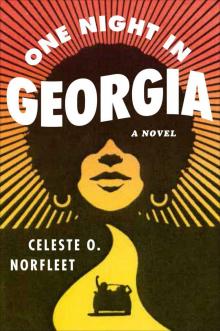 One Night in Georgia
One Night in Georgia Love's Paradise
Love's Paradise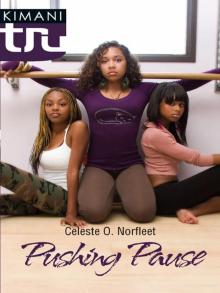 Pushing Pause
Pushing Pause Heart's Choice
Heart's Choice The Thrill of You
The Thrill of You Fast Forward
Fast Forward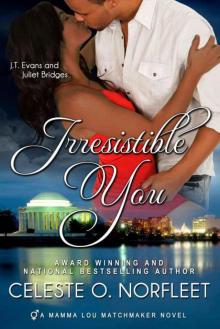 Irresistible You
Irresistible You A Christmas Kiss
A Christmas Kiss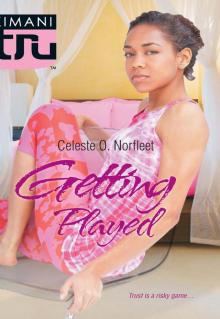 Getting Played
Getting Played When It Feels So Right
When It Feels So Right Cross My Heart
Cross My Heart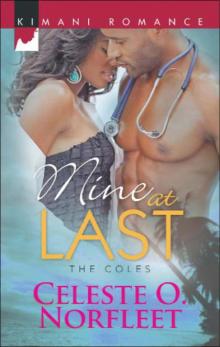 Mine at Last
Mine at Last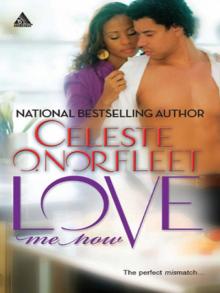 Love Me Now
Love Me Now This Holiday Magic
This Holiday Magic Download Drama
Download Drama